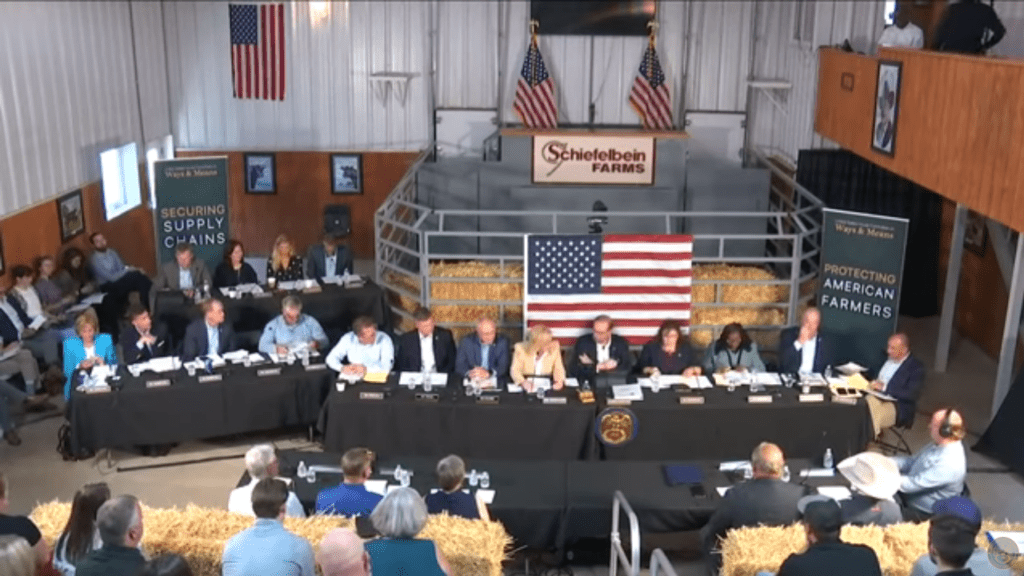Does the U.S. currently have a domestic supply of the minerals needed to power the automobiles of the future that won’t be relying on gasoline? The short answer is no. The worst of it is that China is the lead processor of key minerals used in making the long-life batteries powering the Mustang Mach-E and the Tesla Y. Meanwhile, mines in the U.S. take years to get going. Some are even banned.
The House Ways & Means Committee held a field hearing at a farm in Kimball, Minn. on Monday, July 10 to mostly discuss agricultural supply chains. But the overarching theme was commodities and so new commodities – the mined rock turned into energy sources like nickel and cobalt – was also up for debate.
Tom Bakk, a former elected official in the Minnesota State Legislature, was the sole witness representing the mining industry. He said the roadblocks to digging up and processing minerals in the U.S. was so great, that it was unlikely the U.S. would ever come close to meeting its needs to power the post-fossil fuels economy many in Washington seek to bring about. [Testimony]
He said that the Biden Administration’s move to cancel leases for mines was a headwind not only to the job market, but to the White House’s green technologies initiatives under the Inflation Reduction Act.
Bakk said reliance on foreign sources of critical minerals would grow if the U.S. does not mine and process domestically.
“I believe strongly that developing critical minerals in Minnesota and in the U.S. more broadly is a no-brainer. It’s a must do. Opening non-ferrous mining operations spurs American job creation, it strengthens our supply chains and national security, it fuels the green economy, and it ensures we mine these resources under the highest labor and environmental standards.
Yet, numerous mining projects in the U.S., including ones in Minnesota, are facing endless legal and permitting challenges that make it next to impossible to access these resources. The United States’ reliance on foreign sources of these materials reached an all-time high in 2022. It is frankly unacceptable that the U.S. continues to import critical minerals from areas of the world where environmental and labor standards are practically non-existent. Especially when we have these resources – and companies that are proposing to develop them responsibly and sustainably – here at home. You know what makes no sense to me? On the one hand we set aggressive goals on reducing our nation’s greenhouse gas emissions, and at the same time we’re slowing or halting the mining projects that are needed to meet those goals.” – Former Minnesota state Senator, Tom Bakk, during the House Ways & Means Committee hearing, July 10.
Bakk detailed the economic downturn experienced by rural Minnesotan areas due to increased barriers to the mine permitting process. He said the environmental review process discourages investments in U.S. mineral refining facilities, and he told the Committee to get Congress to reform those regulations to make it easier to process minerals domestically. Otherwise, the U.S. is merely outsourcing pollution.
Rep. Pete Stauber (R-MN) highlighted recent export limits from China on their critical minerals to Japan and South Korea and said the same could happen to the U.S.
Rep. Greg Murphy (R-NC) criticized the lack of federal support for domestic mining. Bakk stated that the U.S. military is reliant on foreign sources of rare earths used to make magnets, for example.
EV Batteries & “Reshoring”
For EV batteries to reshore, battery makers don’t just need incentives like those provided in the Inflation Reduction Act. They also need reliable, local supply that is not subject to geopolitical tensions. In many ways, these critical minerals used to power car fleets are like oil and gasoline, run in large part by OPEC producers. As it is now, China is a leading provider, making them akin to the world’s Green OPEC – an envious position.
A policy paper by CPA published in June 2022 predicted that the U.S. will fall further behind China by 2025 and remain dependent on imports for more than half of its EV battery needs.
Four key materials make up the majority of materials needed to compile lithium-ion batteries used in EVs — lithium, nickel, cobalt, and copper. These metals make up roughly 50% of a battery’s cost.
To overcome the lack of access to materials, legacy automakers are doing venture deals with foreign battery makers with access to the raw goods, as Fast Company magazine noted in an article July 7.
Ford announced that it will partner with China’s leading battery maker, CATL, for a $3.5 billion plant it wants to build in Michigan. CATL will have easy access to all the raw materials it needs, especially cobalt, where China has an outsized footprint in the Congo, the world’s leading cobalt producer.
“We should mine critical minerals that America does have because our methods are cleaner and we pay workers well,” said CPA CEO Michael Stumo. “Where we do not have sufficient raw materials, the U.S. should import the minerals from abroad and process them here. It will lead to jobs, investments, and displace polluting refineries in China and elsewhere.”













